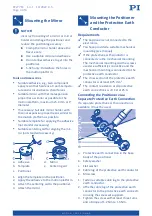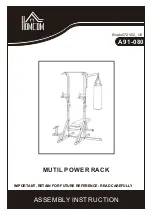
PZ277EK 1.3.1 10/2022. 0.5
Page 2 of 6
Safety
Intended Use
The positioner is a laboratory device as defined
by DIN EN 61010-1. It is intended for indoor use
and use in an environment that is free of dirt,
oil, and lubricants.
In accordance with its design, the positioner is
intended for precision positioning and align-
ment of a mirror in two orthogonal axes with
a common center of rotation (parallel kinema-
tics). Some models provide additional vertical
motion. The positioner is
not
intended for
applications in areas, in which a failure would
present severe risks to human beings or the
environment.
The intended use of the positioner is only pos-
sible when completely installed and connected,
and in conjunction with suitable electronics.
The positioner may only be installed, operated,
maintained, and cleaned by authorized and
appropriately qualified personnel.
General Safety Instructions
The positioner is built according to state-of-
the-art technology and recognized safety
standards. Improper use of the positioner may
result in personal injury and/or damage to the
positioner. The operator is responsible for cor-
rect installation and operation of the positioner.
X
Only use the positioner for its intended
purpose, and only use it if it is in perfect
condition.
X
Read the user manual.
X
Immediately eliminate any faults and mal-
functions that are likely to affect safety.
The positioner is maintenance-free and achie-
ves its positioning accuracy as a result of the
optimum alignment of mechanical components
and piezo actuators. Loosened screws cause a
loss in positioning accuracy.
X
Only loosen screws according to the in-
structions in the manual.
X
Do not open the positioner.
Installation
Temperature changes and compressive stress
can induce charges in the positioner. After
disconnection from the electronics, the piezo
actuators can remain charged for several hours.
Touching charged parts can result in minor
injuries from electric shock.
X
Do
not
touch the contacts in the connector.
X
Before mounting, connect the positioner
to the switched-off electronics for a few
seconds to discharge it.
X
If possible: Secure the connectors with
screws against being pulled out.
X
Do not pull connectors out of the electro-
nics during operation.
X
If the connecting cable is accidentally pul-
led out of the positioner during operation:
Switch off the electronics before you recon-
nect the positioner.
Mechanical forces can damage or misalign the
positioner.
X
Avoid shocks and drops.
X
Observe the maximum permissible forces
and torques (see manual).
X
If a mirror holder is to be used: Clamp the
mirror holder above the flexure only.
X
Do not allow adhesive to get into the
positioner.
X
Only ship the positioner in the original
packaging.
If the positioner is vacuum-compatible, attenti-
on must be paid to cleanliness.
X
Only touch the positioner with powder-free
gloves.
X
If necessary: Wipe the positioner to clean it.
Incorrectly fitted screws can cause damage.
X
Select the screw length according to the
depth of the mounting holes.
X
S-325 only: Do
not
use the holes in the
motion platform.
Unsuitable mounting can warp the positioner
and reduce the accuracy.
X
Mount the positioner on an even surface
with similar thermal expansion properties
(for recommended flatness, see manual).
M O T I O N | P O S I T I O N I N G
























